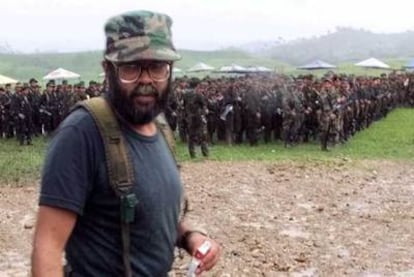Venezuelan officials on Washington's "kingpin list" over FARC allegations
Strategy aimed at getting country registered as a "fallen nation," says Chávez
The US government has designated four top Venezuelan officials as narcotic kingpins for allegedly acting on behalf of the Revolutionary Armed Forces of Colombia (FARC), including helping provide them with weapons.
The action announced on Thursday by the US Treasury's Office of Foreign Assets Control (OFAC) means that US citizens are generally prohibited from doing business with these people, while any assets the designees may have in the United States will be frozen.
The four, all close aides to President Hugo Chávez, were identified as Amilcar Jesús Figueroa Salazar, a Latin American Parliament member; Cliver Antonio Alcalá Cordones, an army major general; Freddy Alirio Bernal, a former Caracas mayor; and Ramón Isidro Madriz Moreno, a key officer in Venezuela's intelligence service SEBIN.
On Saturday, Chávez condemned Washington's move, saying that the US kingpin list was "laughable."
"I challenge President Obama to present proof of this infamy [...] This is truly an infamy because it forms part of the attacks against Venezuela - the imperialist Yankee's goal to one day put Venezuela, by adding one little thing after another, on their list of what they call fallen nations."
According to the US government, Figueroa Salazar has "served as a primary arms dealer for the FARC" and has also provided training to the Colombian insurgency. Alcalá used his position as head of the fourth armed division "to establish an arms for drugs route" for the FARC while Madriz Moreno coordinated security and Bernal Rosales "facilitated arms sales" between the Venezuelan government and the guerrillas, the OFAC said in a press release.
On his Twitter account, Bernal called the US government's move an "attack on the homeland."
"If they are trying to intimidate me with their gringo list, now more than ever, I kneel down for Chávez and the Revolution," wrote Bernal, who is a congressman for Chávez's United Socialist Party of Venezuela (PVSU).
OFAC director Adam Szubin said the US government would "continue to aggressively target the FARC's support structures in Venezuela and throughout the region."
This is not the first time the US Treasury Department has put Venezuelan officials on its kingpin list. In 2008, Washington ordered the freezing of assets of several senior Chávez officials, alleging they were arming and funding the FARC. One of the intelligence officials accused in 2008 was Henry de Jesús Rangel Silva, who has since become Venezuela's top military general.
Colombia has long accused Venezuela of allowing the FARC to set up secret camps on the Venezuelan side of the border.
In a related development, Colombian security forces announced the arrest on Sunday of a FARC leader who is believed to have taken part in the 2002 kidnapping of former presidential candidate Ingrid Betancourt. Gustavo Gómez Urrea, alias "Víctor," had been sentenced for the 1996 killing of a senator. He was arrested in Solano, southern Caqueta department, where he and his brother José Ventura allegedly led the FARC's 15th front.
Apart from being sentenced to 38 years in prison for the murder of congressman Rodrigo Turbay Cote, Gómez Urrea has additional arrest warrants against him for his alleged role in kidnapping, homicide, terrorism and rebellion.
Police said they also arrested a 40-year-old woman accused of keeping FARC kidnapping victims in her home. Margarita Cortez Calderón, alias "La Mona" and known as a FARC jailer, was arrested in a rural zone in the central department of Meta on charges of kidnapping, extortion, rebellion, conspiracy, and terrorism. According to the authorities, she spent 25 years as a member of the FARC's 43rd front.

Tu suscripción se está usando en otro dispositivo
¿Quieres añadir otro usuario a tu suscripción?
Si continúas leyendo en este dispositivo, no se podrá leer en el otro.
FlechaTu suscripción se está usando en otro dispositivo y solo puedes acceder a EL PAÍS desde un dispositivo a la vez.
Si quieres compartir tu cuenta, cambia tu suscripción a la modalidad Premium, así podrás añadir otro usuario. Cada uno accederá con su propia cuenta de email, lo que os permitirá personalizar vuestra experiencia en EL PAÍS.
En el caso de no saber quién está usando tu cuenta, te recomendamos cambiar tu contraseña aquí.
Si decides continuar compartiendo tu cuenta, este mensaje se mostrará en tu dispositivo y en el de la otra persona que está usando tu cuenta de forma indefinida, afectando a tu experiencia de lectura. Puedes consultar aquí los términos y condiciones de la suscripción digital.








































